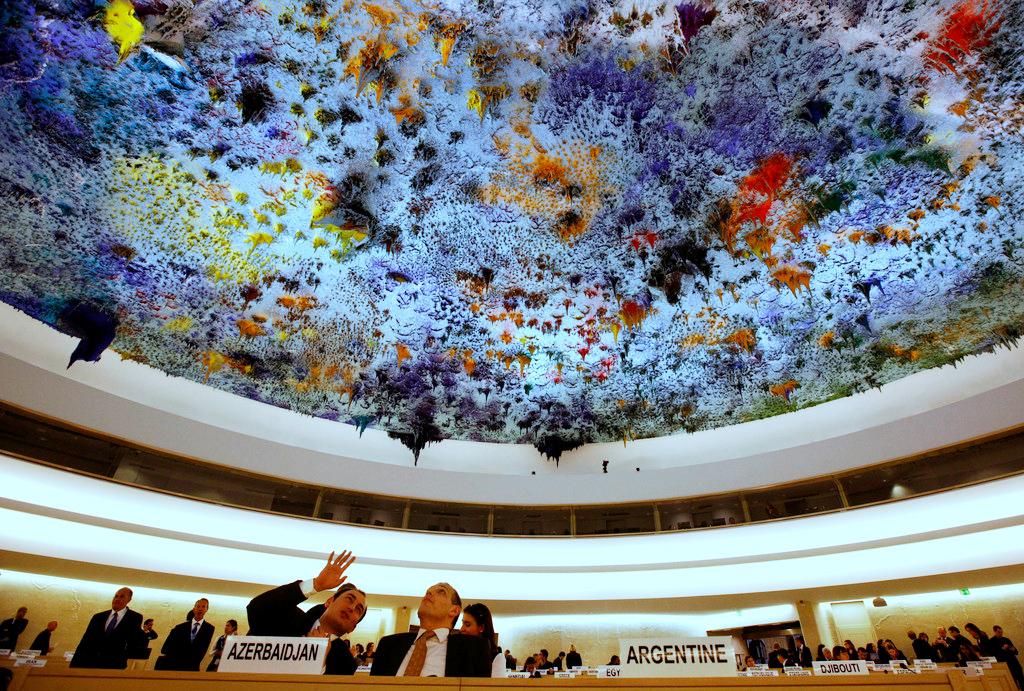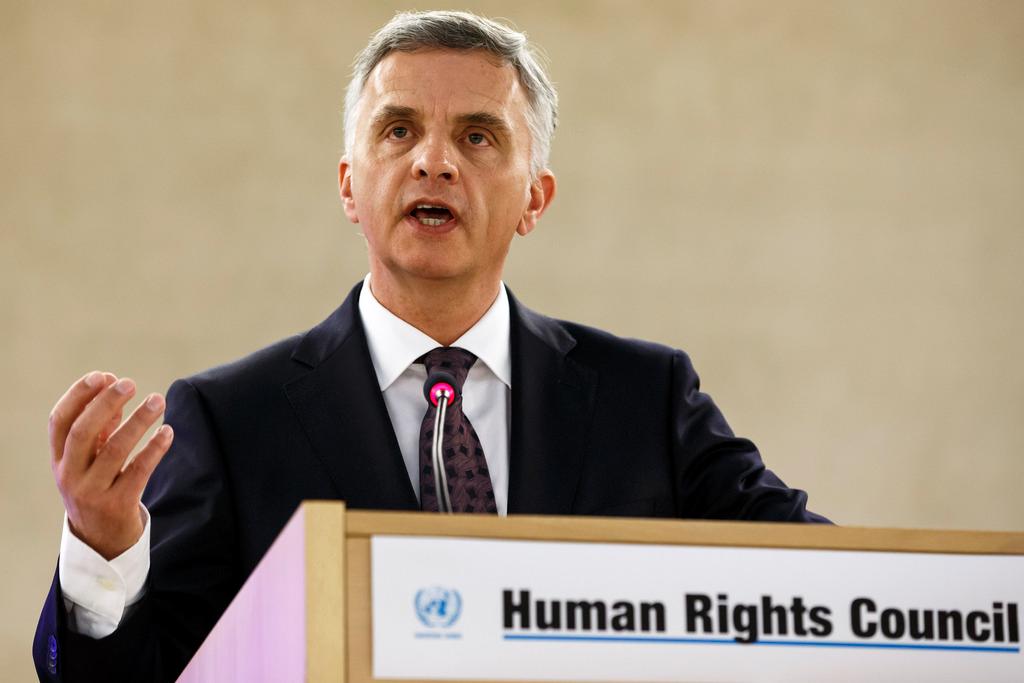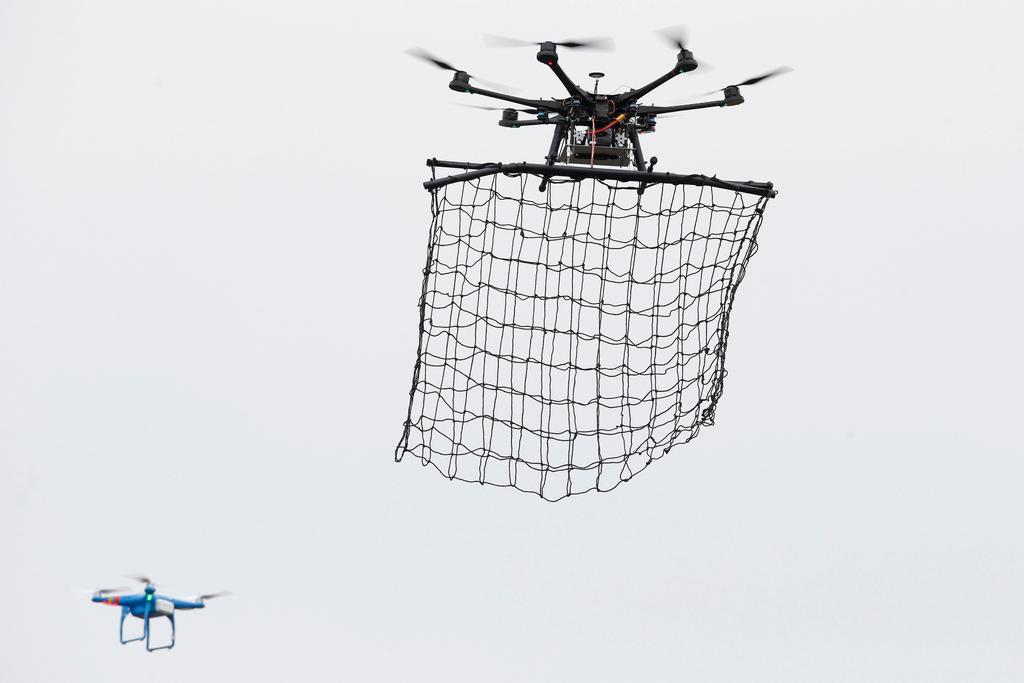Nations seek progress in Geneva despite tensions

While the United Nations Security Council in New York is deadlocked over crises such as Ukraine or Syria, top diplomats have been marking their territory in Geneva and hoping to make headway behind the scenes of the ongoing Human Rights Council.
It’s been a busy week for the March session of the Geneva-based council. In all, 93 heads of state and government ministers flew in for the so-called High-Level Segment talks and filed through the doors of Room XX at the UN headquarters, with its colourful dome created by Spanish painter Miquel Barceló.
“It’s a growing trend in recent years. States come for this high-level debate to present their policies. It really lets you to get a good overview of the priorities for each country,” said Adrien-Claude Zoller, founder of the non-governmental organisation Geneva for Human Rights, who has been following the UN for over 40 years.
The tensions and crises threatening different parts of the world attracted two big hitters to Geneva. The United States Secretary of State, John Kerry, and the Russian foreign minister, Sergei Lavrov, were in the city in western Switzerland for ‘frank discussions’ on Ukraine, Syria and Iran.
Just met with @mfa_russiaExternal link FM Lavrov for frank discussions on #UkraineExternal link, #SyriaExternal link & #IranTalksExternal link. pic.twitter.com/bHKTd2sUgLExternal link
— John Kerry (@JohnKerry) March 2, 2015External linkTheir differences were on full display. During his opening speech, Kerry said he was extremely proud of America’s human rights record: “Even as we acknowledge the challenges of our history and those we continue to face today, I don’t think there’s any other country in the world that has worked harder to expand human rights than the United States of America.”
Lavrov meanwhile urged the international community to “rid itself of all messianic lecturing and to respect global diversity”.
Geneva-based American political scientist Daniel Warner, Assistant Director for International Relations at the Geneva Centre for the Democratic Control of Armed Forces, welcomed the fact that the council seemed to be taken seriously by top officials.
“But it’s also an extremely busy time for diplomacy, whether in Iran, Israel, Ukraine, Libya or Syria, where human rights issues struggle to find space.”
He went on: “To resolve the Iranian nuclear question the Russians have to be involved. It’s interesting to see Lavrov and Kerry bring this up during the council session, as well as Ukraine. These private talks reveal the links between the different problems for these world powers and shows that a minimum level of cooperation is needed.”
Out of sight
Most of the important talks this week took place away from the watchful eyes of the press.
“The council has become a forum where states outline their positions but there are also a huge number of behind-the-scenes meetings ahead of future negotiations. It’s also an opportunity to avoid future clashes,” said Zoller.
“Geneva only has a few big hotels so people meet easily. Every minister in Geneva has a packed agenda. During the two weeks before the council session the permanent diplomatic missions spend their whole time preparing for talks and interviews. It’s a multilateral forum which goes well beyond human rights.”
But with all this buzz of diplomatic activity, don’t human rights simply end up taking a back seat?
Former Swiss ambassador François Nordmann, a keen observer of International Geneva, does not think so: “People always still talk in terms of human rights and this high-level presence shows that the council works; no one contests it.”
Once the heads of states and ministers finished their high-level show and flew out, the council then got down to its real work, said Zoller.
Fiji and Botswana
But this week was not all about the world powers sparring behind the scenes, he added.
“After various coup d’états Fiji has an elected government. The visit to Geneva by its prime minister is a major occasion for Fiji and for those people working on some of the problems the island is facing, such as racial discrimination,” he explained.
Fiji Prime Minister Voreqe Bainimarama told the council that major human rights changes were underway on the small South Pacific island state. He was elected leader last September when Fiji returned to democracy, eight years after he seized power in a military coup.
Another important example was Botswana, which unlike other African countries, has not experienced a coup d’état since it became independent from Britain almost 40 years ago.
“The government has completely revised its human rights policies. They are now overseen by the foreign affairs minister who came to Geneva to confirm this policy,” said Zoller.
Two weights, two measures
It remains to be seen whether the kind of political clashes which undermined the Commission on Human Rights, the discredited forerunner of the Human Rights Council, are re-emerging.
This is one concern of Javad Zarif, Iran’s foreign minister: “In spite of momentous achievements of the UN, the outdated paradigm of exclusion has managed to creep in, turning the duty to cooperate into propensity to politicise. The impact has nowhere been more damaging than in the field of human rights.”
Zarif complained of selectivity and double standards saying despite the fight against intolerance, people were “glorifying” caricatures which hurt all Muslims worldwide as freedom of expression.
The minister urged western states to do some soul-searching: “Why quite a sizeable number of individuals and groups espousing extremist ideologies and engaged in acts of brutal terror and heinous violence in Europe and on a much bigger scale in Iraq and Syria happen to be second-generation citizens of ‘western democracies’?”
Without commenting on the Iranian minister’s remarks, Nordmann said there was certainly a general risk the council becoming politicised again.
“But the human rights council is not an expert body. It’s a council regrouping states which does human rights politics.”
One thing is sure, said Warner: the UN is a resilient animal.
“If you look at the UN’s primary role which is to maintain and restore peace, this kind of session in Geneva shows that the UN is not as outmoded as some people think. At least international law standards are maintained by the rights council, even if the UN has difficulty getting them respected,” he said.
As to the major crises currently facing the world, Warner remains upbeat: “People talk about a new Cold War or possible Third World War. But here in Geneva we saw that Kerry and Lavrov are seeking to cooperate on a number of different issues.”
Swiss minister’s concerns
As host, Swiss Foreign Minister Didier Burkhalter gave one of the first speeches during the high-level segment on March 2 at the opening of the 28th session of the UN Human Rights Council in Geneva. His speech focused on his concerns over terrorism.
“What could possibly be sadder and more depraved than forcing little girls to blow themselves up in a market place full of people?…What could be more cowardly than to seek to silence free speech? What could be more intolerant than to seek to destroy the symbols of whatever religion and to attack those who practice it – whether they Jewish, Muslim or other,” he declared.
ICRC alert
In his speech the president of the International Committee of the Red Cross, Peter Maurer, underlined his concerns about violations of human rights and lack of humanity.
“What does humanity mean?…It means access to health care for all the wounded and sick, without any sort of distinction….Humanity also imposes limits on the excessive use of violence. In international humanitarian law, the principles of precaution, proportionality and distinction preclude the use of any weapons that make it impossible to distinguish between civilians and combatants and of weapons whose effects are considered abhorrent or contrary to the public conscience…Humanity means treatment respecting human dignity in all circumstances, especially that of captured enemies and detainees in general.”

In compliance with the JTI standards
More: SWI swissinfo.ch certified by the Journalism Trust Initiative



You can find an overview of ongoing debates with our journalists here. Please join us!
If you want to start a conversation about a topic raised in this article or want to report factual errors, email us at english@swissinfo.ch.